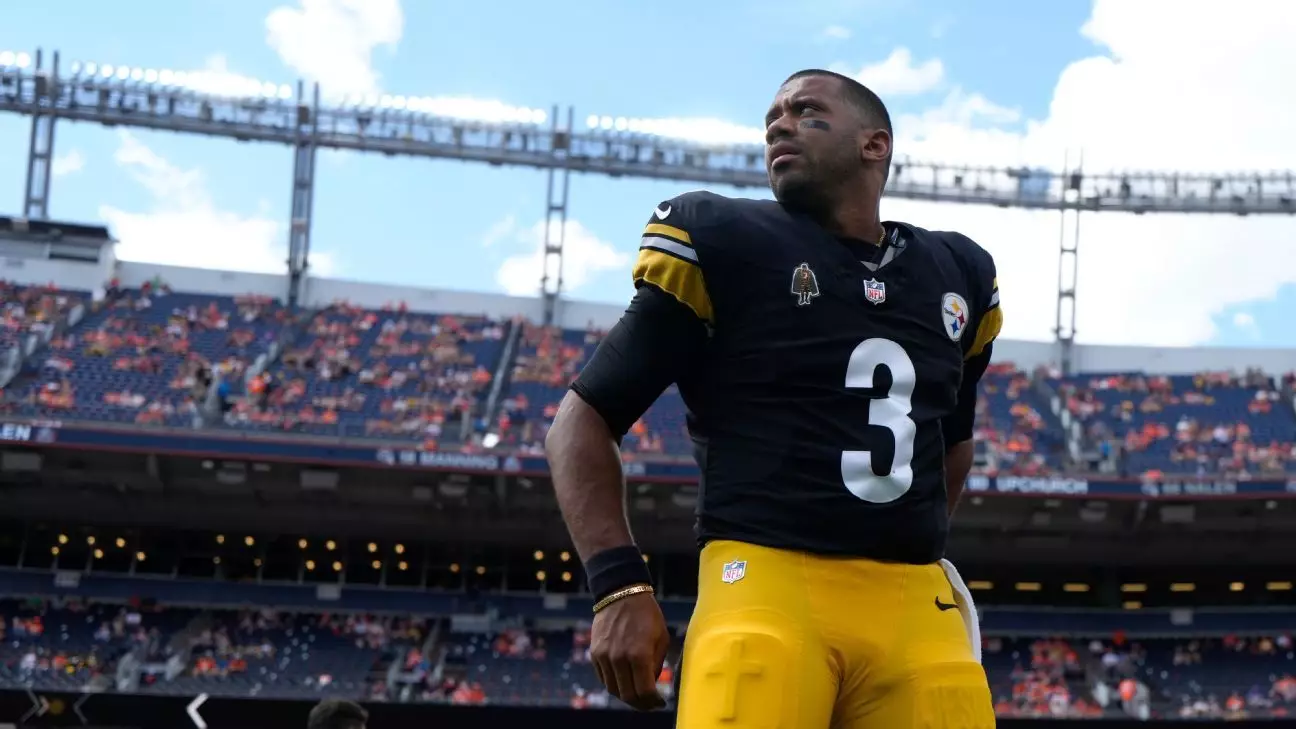In an intriguing matchup between the Pittsburgh Steelers and the Denver Broncos, even the absence of quarterback Russell Wilson on the playing field did not detract from the emotional narrative that unfolded. Coach Mike Tomlin’s decision to award Wilson a so-called “petty game ball” highlighted not just a tactical triumph for the Steelers but also a poignant reflection on Wilson’s tumultuous journey with the Broncos. The phrase “petty” itself carries a certain weight in the sports realm, particularly when it comes to players seeking redemption or recognition from former teams.
As articulated by Steelers quarterback Justin Fields, the acknowledgment represented a deeper context: Wilson had indeed faced turmoil during his tenure in Denver. The reality of a once-celebrated quarterback released by his team after two years on a massive $242.6 million contract encapsulates a narrative of unmet expectations. Fields characterized the game ball as a symbolic gesture meant to rally the team and recognize Wilson’s struggles, even if he was sidelined due to an aggravated calf injury.
Walking onto the very field that served as the backdrop for both triumphs and tribulations, Wilson made an effort to maintain his connections during warmups. His interactions with fellow quarterbacks and former coaches painted a picture of a player who, despite professional setbacks, valued relationships cultivated over time. One could argue this approach displays maturity and resilience which are marks of true leadership.
However, it is essential to scrutinize the contradictions present in Wilson’s return. While he was warmly received by some familiar faces, his status as the emergency third quarterback for the second consecutive week represents a stark contrast to the aspirations he once held. Here lies an irony that seems to encapsulate his entire stay in Denver: promising potential overshadowed by underperformance and missed opportunities.
Huddled on the sidelines, Wilson now serves as a quiet reminder of the volatility of professional sports, where status can change almost overnight. It’s a stark reminder of the thin line between success and failure in the NFL, where even the most decorated athletes can find themselves grappling for relevance.
Moving beyond Wilson’s personal story, the spotlight turned to Justin Fields, who was tasked with leading the Steelers as they navigated their way to victory over the Broncos. Understanding the ups and downs Fields faced during his second start adds layers to this unfolding narrative. His impressive start—10 completions on 12 attempts for 101 yards and a touchdown—showed flashes of brilliance. However, his performance was not without its stumbles.
The second half showcased his struggles, as the Steelers’ offense ground to a halt with just 16 passing yards. This inconsistency sheds light on the complex nature of NFL games, where one moment’s success can quickly give way to another’s failure. Fields himself acknowledged the difficulty of winning in hostile arenas, a testament to the mental and physical stamina required to navigate the pressures of professional football.
Furthermore, watching how the Steelers executed their game plan against a team with Wilson’s backdrop illustrates the varying dynamics at play. The confluence of Wilson’s emotional return, Fields’ emerging role, and the peculiarities of the game reflect the intricacies of sports where individual and collective narratives entwine.
The encounter between the Steelers and Broncos serves as an important chapter in both Russell Wilson’s career and the current trajectory of the NFL. While Wilson finds himself again wrestling with the ghosts of his past, his teammates and the Steelers organization stand as pillars of support. It reminds us that sports are not solely about wins and losses; they echo life’s more profound challenges—including relationships, redemption, and resilience.
Whether Wilson’s journey will take a turning point in the future remains uncertain. But for now, the game ball symbolizes more than just victory; it points toward a narrative of perseverance and an acknowledgment that, even in defeat or sidelined status, one can still earn respect and support from peers. The unfolding journey of Russell Wilson, Justin Fields, and the Steelers establishes an engaging chronicle in a volatile yet utterly captivating sport.


Leave a Reply